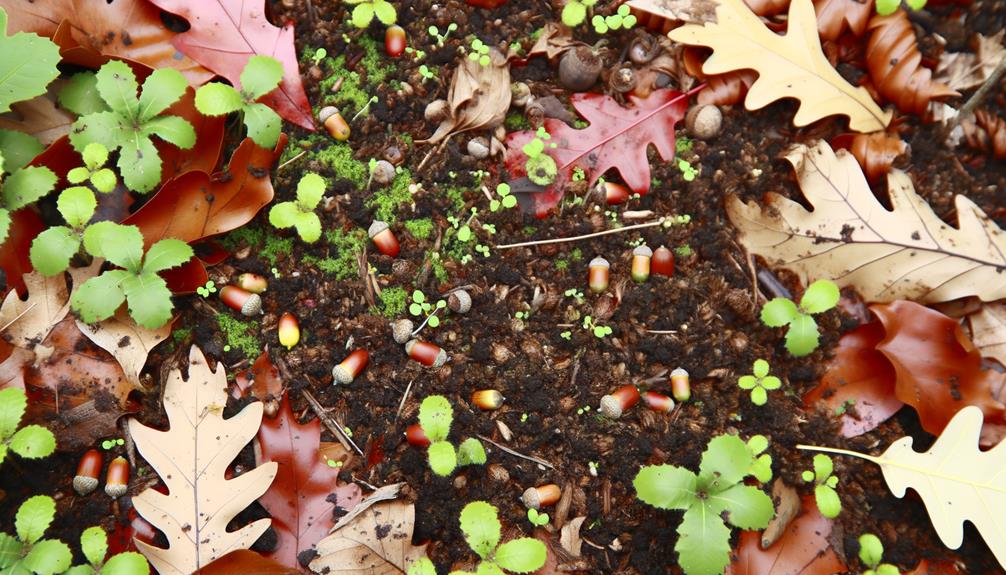

You can compost acorns, but you’ll need to prepare them for effective decomposition. Due to their tough shells and high tannin content, acorns decompose slowly. Start by removing the caps and crushing or shredding the shells to speed up the process. Balance the carbon-heavy acorns with nitrogen-rich materials like grass clippings or kitchen scraps.
Regularly turn the compost to enhance breakdown and reduce any tannin-related issues. While composting acorns enriches soil and reduces waste, proper preparation and balance are key to success. To explore more detailed techniques and tips, there’s much more knowledge awaiting you.
To effectively compost acorns, it’s important to first understand their unique properties and composition. Acorns come from various oak trees, and these acorn species can impact how you compost them.
Each acorn consists of a tough outer shell, a nutrient-rich kernel, and a cap. This acorn anatomy means they’re rich in tannins, which can slow down decomposition. To speed up the composting process, you should crush or shred the acorns. This breaks down the hard shell, allowing microbes to access the nutrients more easily.
Be aware that different acorn species, like white oak or red oak, might’ve varying levels of tannins. By understanding these aspects, you can better manage your acorn composting process.
Composting acorns enriches your soil with valuable nutrients and helps reduce waste. When you compost acorns, you introduce essential minerals such as nitrogen, phosphorus, and potassium into your compost.
These minerals are crucial for plant growth and overall soil enrichment. By adding acorns to your compost pile, you’re also contributing to waste reduction by reusing natural materials that would otherwise go to landfills.
Here’s a quick look at the benefits:
| Benefit | Description |
|---|---|
| Soil Enrichment | Adds essential minerals like nitrogen and phosphorus |
| Waste Reduction | Decreases landfill waste by reusing organic materials |
| Soil Structure | Improves soil texture and drainage |
| Ecosystem Health | Supports beneficial microorganisms in the soil |
Also Read: Can You Compost Balloon?
While composting acorns offers numerous benefits, you might encounter some challenges that require careful management. Acorn anatomy can make them slow to decompose, and their tough shells can resist breaking down in the compost pile.

Additionally, acorns can attract acorn wildlife like squirrels, which might dig into your compost to retrieve them. Here are some challenges you might face:
Understanding these challenges will help you manage your compost effectively and make certain it’s beneficial for your garden.
Also Read: Can You Compost Cotton Balls? The Shocking Truth Revealed!
To prepare acorns for composting, start by removing the caps and then crush the shells to speed up decomposition.
Make sure to balance the carbon ratio by mixing acorns with nitrogen-rich materials like grass clippings or kitchen scraps. This combination will help create an effective compost mix.
Start by gently twisting the acorn caps to remove them before adding the acorns to your compost pile. Removing the caps helps speed up decomposition and improves seed viability.
Here’s what you can do:
Once the caps are removed, break the acorn shells into smaller pieces to accelerate the composting process. Acorn shells are quite durable, so you’ll need effective crushing methods. You can use a hammer or a sturdy mallet to crush the shells.
Place the acorns in a sturdy bag or between two boards to prevent pieces from scattering. Alternatively, a mortar and pestle can make the task more manageable. Crushing the shells increases their surface area, helping microorganisms break them down faster.
This step is crucial because the hardened outer layer of the acorn is resistant to decomposition. By reducing their size, you make sure that the acorns integrate smoothly into your compost pile, enhancing the composting efficiency.
After crushing the acorn shells, focus on balancing the carbon ratio to guarantee efficient composting. Acorns, like other nut varieties, have unique botanical characteristics that can impact your compost mix. To maintain a balanced carbon-to-nitrogen ratio, combine the acorn shells with high-nitrogen materials.
Here’s what you can add:
Mixing these materials ensures that the acorns decompose properly without causing a nitrogen deficiency.
Also Read: Compost Mold Dilemma: Is It Worrisome or Worthwhile?
When incorporating acorns into your compost, it’s crucial to balance their carbon-to-nitrogen ratio.
Acorns are high in carbon, so you’ll need to mix them with nitrogen-rich materials like grass clippings or kitchen scraps.
Grinding the acorns into smaller pieces can also help them break down more efficiently in the compost.
Balancing acorns in your compost requires understanding their high carbon-to-nitrogen ratio. Acorns are rich in carbon, which means you’ll need to balance them with nitrogen-rich materials to create effective compost.
First, start by identifying acorns and understanding their anatomy. Each acorn consists of:
These components contribute to their high carbon content.
To guarantee your compost thrives, mix acorns with green materials like grass clippings or kitchen scraps. Aim for a balanced ratio of 30 parts carbon to 1 part nitrogen. This mix allows microbes to break down the compost efficiently.
Monitor your pile regularly to make sure it stays balanced and decomposes properly.
To optimize the composting process, you’ll need to grind acorns to increase their surface area and accelerate decomposition. Grinding acorns helps prevent acorn pests by breaking down the hard shells, making it less likely for insects to thrive. Use a sturdy blender or a dedicated grinder for this task.
Before grinding, make sure your acorn storage is dry and free from mold to avoid contamination in your compost pile.
Balancing ground acorns in your compost is essential. Mix them with nitrogen-rich materials like kitchen scraps or grass clippings to maintain a proper carbon-to-nitrogen ratio. Regularly turning your compost pile will further enhance decomposition.
Properly managed, ground acorns can be a valuable addition to your composting efforts.
Also Read: Pistachio Shells Compostability: Breaking the Myths
Speed up acorn decomposition by breaking them into smaller pieces and mixing them with nitrogen-rich materials. According to decomposition theory, smaller pieces increase surface area, enhancing microbial activity.
Microbes thrive when they have the right balance of carbon and nitrogen, so adding green materials like grass clippings or kitchen scraps helps.
To further accelerate the process:
While composting acorns is effective, there are other ways to repurpose them that might suit your needs better.

For instance, you can use acorns in a variety of acorn crafts. Create decorative wreaths, festive garlands, or even unique jewelry pieces. Their hard shells and natural colors make them perfect for DIY projects.
If crafting isn’t your thing, consider using acorns as wildlife feed. Squirrels, deer, and other wildlife love them. Scatter acorns in your yard or a nearby wooded area to support local fauna. Just make sure the acorns are free from pesticides.
These alternatives not only help you manage acorn abundance but also provide creative and ecological benefits, making good use of what nature offers.
Wrapping it all up, acorns offer a versatile and eco-friendly resource that can be utilized in numerous ways beyond just composting. By understanding their potential, you can make the most of these abundant nuts. Consider these benefits:
While adding acorns to your compost pile is beneficial, remember to balance their high tannin content with other organic matter.
Embrace their full potential by exploring different uses that contribute to a sustainable environment. You’ll find that acorns are more than just debris in your yard.
